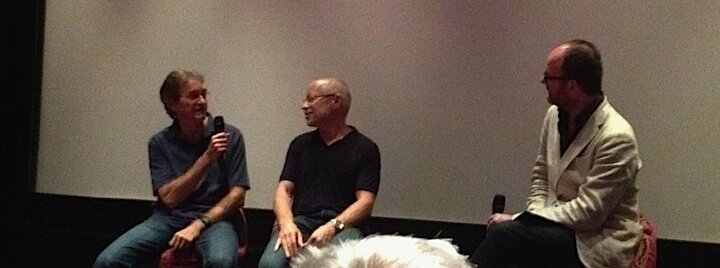Login
iFlicks on Twitter
| Q+A: Samsara (Ron Fricke, Mark Magidson) |  |
 |
| Written by Ivan Radford |
| Thursday, 30 August 2012 11:24 |
|
Samsara is out in UK cinemas this weekend - and it's one heck of a unique cinematic experience. No words, no story, not even a fixed location, it's classed as a documentary but is far closer to a guided meditation. Or, if that sounds too intimidating, the greatest screensaver you'll ever see in your life. I had my retinas blasted by Samsara's stunning time lapse imagery a couple of weeks ago at its London premiere. Attended by director Ron Fricke and stalwart colleague/editor Mark Magidson, who worked together on the similar-themed Baraka, they stayed behind to try and answer questions from a room full of dazed onlookers. From the film's content (dancers, cities, food factories) to its music, here are a few of the best questions and answers... Where did the idea come from? Ron Samsara is word that means birth death and rebirth and that is where the theme for the research came from. So we directed our research towards locations that would yield that kind of material in a highly visual way. How do you find these places? Is research tough? Mark YouTube! (Laughs) The internet does it make more much accessible to find these locations. For example, my neighbour put me onto the thousand hands dancers. Was it difficult to get access to some of the locations? Mark Getting access is a difficulty. You have to just take them on one at a time and try to knock down the barriers. We tried to get into food factories in America but they wouldn't let us, so we went to China. But as well as getting access, it’s about identifying material that fits within the thematic structure and rises to a certain level – that’s challenging. You use 70mm rather than digital. Why is that? And is that more difficult? Mark I think the transporting equipment part isn’t so difficult, it’s the film stock that’s hard – since 9/11 it’s hard to get film in and out of the US. Digital technology is constantly evolving, but we started in 2007 and we just didn’t feel it was ready. There’s really nothing like 65mm negative. Ron We’re not working with humans or people as our characters; the images are our characters and the 65mm is important to bring out the essence of the location and landscape. Who knows? In another year, we’ll have 8k, 10k sensors that’ll match the 65mm. We never considered 3D on this project, but maybe for the next one… There's a great bit during one of the human portraits where a geisha starts to cry. While you were shooting, did you have any moments where you filmed something and thought: "Yes, that was perfect"? Ron She was a professional geisha that we hired to stare into the camera. The direction to all the subjects was "Don’t blink", because blinky portraits just don’t work. So I’m on the dolly, which is being pushed real slowly… and right in the sweet spot of the shot, this tear comes out of her eye - and she didn’t blink. It was because of the make-up and the lights. And I couldn’t believe it in the viewfinder! I was saying to myself “Yes! Yes!” Once you've filmed all of these moments, how do you go about editing the mass of footage? Mark There is a critical structure and component to the film that we had worked out – the sand mandala, the creation and destruction of this bead portrait. It sounds good until you have to get it. But we went out and once we had that we felt we had the shape structurally. That’s the hard part. After Baraka, are you more relaxed when making this kind of film? Mark We were more relaxed. This is a film where it’s made in the edit. You have to be open to that. You’re filming non-fiction that has its own essence and you need to be able to feel the totality of what you’re working on. There are opportunities to find connections between that material you can’t have written. Similarly, do you have to be open to things that you don't plan for while on-location? Ron Yeah, you have to be or you’re just wasting your time! There are a lot of things that happens that are happy accidents or good luck moments to go with the bad luck moments. There are times you get rained out, but then there are the magical bits where you’re in a hot air balloon and you get perfect weather – or that geisha shot. You have to take advantage of that luck. You've got three composers listed in the credits - Marcello De Francisci, Lisa Gerrard and Michael Stearns. When does music come into the editing process? Mark We actually edited in silence this time, which is different to Baraka – we wanted to let the visuals speak, rather than the other way round. We edited the visuals in sequences, sequences that we could then slide around and try in different places, using the anchors of the sand mandala. Ron We have 3 composers. We worked with Lisa (Gerrard) and Michael (Stearns) on Baraka. Once we had edited the film in sequences, we gave those segments to the composers to add music to. What’s nice about that is trying to avoid scoring every edit in the film with a musical highlight or commentary; it was a piece of music we wanted, as a whole. The composers got to know the film really well silently and they’re intuitive and they would do sketches for ideas and submit them to us. But we were all working for six months on this, just totally immersed… Some shots in the film - such as the food processing factory - feel like they're making more of an explicit social comment than Baraka. Is that intentional? Ron We actually tried our best not to let the images become narrative. When you put five or six images together, they want to speak about the subject and make a comment, but we tried to keep it in the middle and concentrate on the flow. As Mark says, we cut in blocks to subjects, and we’d then move those blocks to get the right flow. Do you find yourself with much footage leftover at the end? Ron There's not that much that’s really good that’s not in the film! We have some interesting subject matter, but you’ve got to remember you're not making a documentary about certain subjects – we’re really using what we can. And what about funding? Is that less of a challenge now? Mark It’s independently funded, but we’ve got a track record with Baraka that’s been pretty successful. It’s hard – it’s a chicken and egg thing – but if we didn’t have Baraka it would be harder. And it’s nice to see that. We weren’t aware the extent to which Baraka had become known around the world! It wasn’t the most successful film theatrically when it was first released 20 years ago, but over time it has found audiences... Hopefully Samsara will do the same. It's released in UK cinemas tomorrow. Read our Samsara review, then go and see it - you won't regret it.
Tags:
|
Add your comment
|





